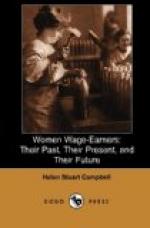Passing now to the Middle Ages, we find conditions curiously involved. The exaltation of celibacy as the true condition for the religious, and the consequent enormous increase of convents, placed fresh barriers in the way of marriage; and the Church having attracted the gentle and devoted among the women and the more intelligent among the men, the reproduction of the species was for the most part still left to the brutal and ignorant, thus leading to a survival of the unfittest to aid in any advancement of the race.
The number of women far exceeded that of men, who died not only from constant feuds and struggles, but from many pestilences, which naturally, in a day when sanitary laws were unknown, ravaged the country. Dr. Karl Buecher, commenting on the relation of this fact to the life of women at that time, notes that from 1336 to 1400 thirty-two years of plague occurred, forty-two between 1400 and 1500, and thirty between 1500 and 1600. In addition to the convents, which received the well-to-do, many towns established Bettina institutions, houses of God, where destitute women were cared for; but it was impossible for all who sought admittance to be provided for.
The feudal system, with its absolute power over its serfs, had driven thousands into open revolt; and beggars, highwaymen, and robbers made life perilous and trade impossible.
The towns banded together for protection of life and industry, and thus developed the guild of the Middle Ages. Relieved from the fear of free-booting barons, no less dangerous than the hordes of organized robbers, these guilds grew populous and powerful. Licentiousness did not, however, lessen. Luther thundered against it, before his own revolt came; and the Reformation demanded marriage as the right and privilege of a people falsely taught its debasing and unholy nature.
We count the days of chivalry as the paradise of women. Chivalry was for the few, not the many; for the mass of women was still the utter degradation of a barbarous past, and the burden of grinding laws resulting from it. With the Reformation, Germany ceased to be the centre of European traffic; and Spain, Portugal, Holland, and England took the lead in quick succession, England retaining it to the present time. German commerce and trade steadily declined; and as the guilds saw their importance and profits lessen, they made fresh and more stringent regulations against all new-comers. Competitors of every order were refused admission. Heavy taxes on settlement, costly master-examinations, limitations of every trade to a certain number of masters and journeymen, forced thousands into dependence from which there was no escape.




